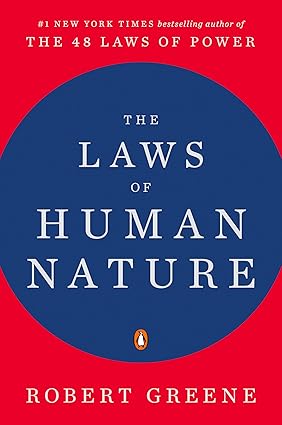Length: 624 pages
Genre: Psychology / Philosophy / Self-help / Social Behavior
Introduction
Robert Greene’s The Laws of Human Nature is a monumental work that dives deep into the psychology of human behavior. Known for bestsellers like The 48 Laws of Power and Mastery, Greene takes a broader and more introspective approach in this 2018 release. In this book, Greene explores the complex, and often hidden, motivations behind human actions. His central argument is that by understanding the fundamental “laws” of human nature, we can learn to influence others, develop self-awareness, and avoid manipulation.
Greene draws from history, philosophy, and psychology, presenting vivid examples ranging from Pericles of Athens and Queen Elizabeth I to modern figures like Lyndon B. Johnson and Coco Chanel. This blend of narrative and theory makes The Laws of Human Nature a unique and comprehensive exploration of human behavior.
This review will analyze the book’s structure, themes, strengths, and weaknesses, offering a balanced critique for potential readers.
Summary of Key Themes
Greene organizes the book around 18 laws, each representing a psychological truth about human behavior. Some of the most notable include:
- The Law of Irrationality: Humans are governed more by emotion than logic. Mastering emotional intelligence is the key to sound decision-making.
- The Law of Narcissism: Everyone is narcissistic to some degree. Understanding people’s need for validation helps in dealing with them effectively.
- The Law of Role-playing: People hide their true intentions behind social masks. Learning to detect these masks reveals deeper motivations.
- The Law of Covetousness: People are drawn to what they don’t have. Desire is based less on objectivity than on perceived value and scarcity.
- The Law of Shortsightedness: We tend to react based on immediate emotions and desires, often at the cost of long-term gain.
Each law is explained through historical stories, followed by Greene’s analysis and practical applications. The overall message is clear: self-awareness, empathy, and understanding are vital to personal power and success.
Pros
1. Deep Psychological Insight
One of the book’s greatest strengths is its rich psychological insight. Greene combines classic theories from Freud, Jung, and Adler with modern research from behavioral science. He distills complex concepts into digestible, practical rules.
For example, in the chapter on narcissism, Greene doesn’t simply condemn the trait. Instead, he explains its roots in early childhood and shows how we can turn it into empathy. He introduces the concept of “healthy narcissism”—the balance between self-worth and concern for others.
This balanced and nuanced take on human psychology gives the book intellectual credibility and depth.
2. Historical and Real-World Examples
Greene is a master storyteller. He weaves historical narratives and biographies into every chapter, making abstract psychological concepts come alive. Whether discussing Martin Luther King Jr.’s strategic empathy or Richard Nixon’s self-destructive paranoia, the historical examples serve as compelling case studies.
These narratives not only illustrate the laws but also make the book more engaging and memorable. They add historical and cultural context that elevate the book above typical self-help literature.
3. Encouragement of Self-Awareness
Unlike The 48 Laws of Power, which is sometimes criticized for promoting manipulation, The Laws of Human Nature promotes self-awareness and inner growth. Greene encourages readers to understand their own emotions, biases, and behavioral patterns before trying to analyze others.
For example, he stresses the need to confront one’s own irrational tendencies and insecurities before attempting to lead or influence. This inward focus distinguishes the book from more cynical or purely strategic guides.
4. Applicability Across Life Domains
The insights in this book can be applied in various areas—leadership, personal relationships, negotiations, parenting, therapy, and self-development. Whether you are trying to understand your spouse, lead a team, or resist peer pressure, Greene’s laws provide valuable frameworks for interpretation and action.
Each chapter ends with practical steps to embody the law, which makes the advice actionable rather than abstract.
Cons
1. Length and Density
At over 600 pages, The Laws of Human Nature is not a quick read. The book is dense, with long historical anecdotes and philosophical digressions. For readers looking for fast, punchy advice, it may feel overwhelming or unnecessarily wordy.
While Greene’s attention to detail is commendable, some chapters could be more concise. The heavy intellectual load may also be intimidating for casual readers.
2. Tone Can Be Cynical or Deterministic
Although Greene strives for balance, some chapters lean toward a cynical view of human nature. He frequently discusses manipulation, envy, and power games. This may leave some readers feeling disillusioned or pessimistic about interpersonal relationships.
Furthermore, the concept of “laws” suggests a certain rigidity or determinism, which can be problematic. Human behavior is highly context-dependent, and Greene sometimes presents his interpretations as universal truths, which may not apply equally across cultures or individuals.
3. Limited Discussion of Cultural Variation
Most of the examples and psychological assumptions are rooted in Western history and thought. There is little exploration of how cultural or social differences might affect behavior. Given the book’s global popularity, a deeper dive into cross-cultural psychology would have broadened its relevance and insight.
4. Repetition and Predictability
Once the structure of each chapter becomes familiar—historical anecdote, psychological explanation, practical takeaway—the rest of the book can start to feel formulaic. Some readers may notice recurring ideas (e.g., emotional control, empathy, awareness of masks) dressed in different language across chapters.
Conclusion and Final Thoughts
The Laws of Human Nature is an ambitious and thought-provoking book that offers a penetrating look into why people behave the way they do. Robert Greene delivers a blend of storytelling, psychology, and philosophical reflection that is both enlightening and practical.
The book is best suited for readers who are interested in deep, long-form reading and who appreciate a blend of history, philosophy, and applied psychology. It requires patience and critical thinking but offers substantial rewards in return. Greene’s core message—that mastering human nature begins with understanding ourselves—is one that resonates powerfully in an age marked by distraction, superficial communication, and emotional reactivity.
Despite its flaws, including its length and occasionally cynical tone, The Laws of Human Nature stands as one of Greene’s most mature and insightful works. It doesn’t just teach readers how to influence others; it challenges them to evolve.
Final Rating: ★★★★☆ (4.5/5)
Recommended For: Leaders, thinkers, readers of psychology and history, and anyone seeking greater emotional intelligence and interpersonal understanding.
You can purchase it on Amazon if you like.



